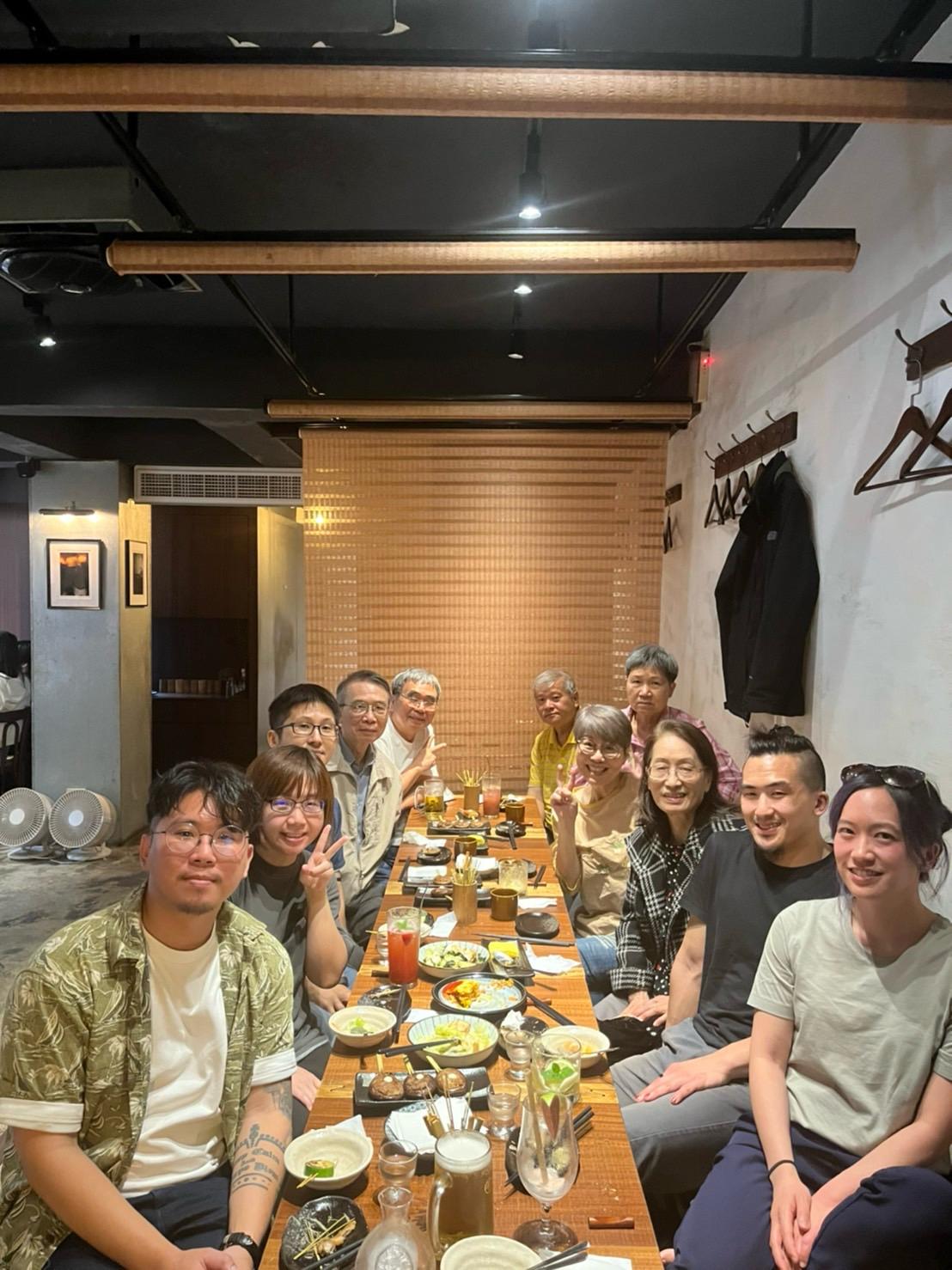the courage to be yourself (asia series 2, straight through the hedge maze, mediocrity as a sure thing)
straight through the hedge maze
I've been reflecting on a conversation that I had with my cousin when I was in Taiwan about career paths. Last I talked to him, he had finished school for engineering, was on the corporate track, and had been working for a couple of years. The natural assumption from hearing this is "you're set - good education, movin' up, and hopped the 'first job' hurdle. 👍"
Unlike most who get comfortable, my cousin refused to check out, and sometime in the past five years, shifted from engineer to bartender. I was relieved to hear that he pivoted because that feeling of "you're set" is one of dangerous complacency that I've felt before too. If you're asking yourself, "hm, is this it?", you're probably on the right track.
He said in Chinese:
"I was trying to connect with my colleagues outside of work, but the chemistry just wasn't there. They just weren't interested in the same things that I was. I enjoy drinking (喝酒) and having conversation (聊天). At these work get-togethers, no one really drank, and when we talked, it was always about work. You know, we just spent our entire week in the office, can't we talk about something else?"
"This had to change. My day to day energy was low because I wasn't jiving with these folks, so I asked myself, what would allow me to drink and have great conversations with interesting people? Bartending. So, I went off to London and trained to be a bartender."
Just like that. 🔪
Growing up Asian meant there were several values and strategies being pushed at the same time. The strategies were a focus on education and finding stable career paths so we wouldn't have to go through the same hardships our parents did. Everything else was an extracurricular, hobbies that shouldn't become a full-time thing, less you wanted to struggle. Then, there were the values of following authority, being deferent, "keeping your head down" and grinding away, all values that were complementary to education.
Seeing my cousin's straightforward thinking was hilarious. It was like experiencing a centuries long argument murdered by simplicity. "I like drinking and having conversations. Doing bartending helps me do more of that stuff. I'll go do that now, see ya. 😂"
I'm 100% confident that if he didn't like some part of it, he would simply do it again: seek out what was interesting to him in the moment and take actions towards it. It's a simple model of identifying your own needs, and placing other considerations such as family values, financial status, and prestige as secondary to curiosity and interest.
From the book, "Crossing the Unknown Sea" by David Whyte, Whyte writes about this:
"If we ignore our simpler necessities, the attempt to create a complex professional identity most often buries us in layers of insulation through which it is impossible to touch our best gifts."
Professionalization is a phenomenon that usually masks our true needs. We're project managers, financial analysts, chefs, baristas, waitresses, computer scientists, researchers. We're improving. We're getting a certification. We're becoming managers. We're business owners. We're constantly labeling ourselves and doing doing doing. We're all about the what, and we forget about the how.
I think the problem with many of us, including me, is that we get entrenched in these labels and get buried to the point where we don't even know what we want our life to feel like aside from what we have to do in the day to day.
Back in 2022, I had a similar experience when I decided I wanted to try working in a kitchen as a chef. This was an idea that was repeatedly shot down by my parents over the years (since 2011), with a non-insignificant amount of warnings about how it was difficult, a hard, low-paying life, and that I would be ruining my social network associating with the "creatures of the night", or some variation of lowering myself in socioeconomic terms. Yeah, it was super cringe.
I hated myself for putting off that experience for so long. First off, I was a fully functioning adult, so really, I shouldn't have cared what my parents thought. But second, I think everyone has a version of my cousin inside of them - the part that just says "fuck it, I'm going to do this and there's nothing you can do to stop me".
I did end up cooking in 2011 for a one-day internship and again in 2022 for six months (so … 2033 for a couple of years? 😂) and I'm re-recapping my experience in a separate series. I still feel the excitement of when I got the opportunity, but I always question how it would've turned out if I had a virgin template without all the dire life warnings and a deeply supportive set of parents towards different life values (artistic expression, beauty, etc). Would it have turned out differently without all the catastrophizing?
Maybe, maybe not. Perhaps I would've arrived at the same conclusion, but I'd like to think I wouldn't have. I'll live with the regret that things might've turned out differently if I said "fuck it" earlier.
In the moment though, I was excited to be in the throes of practicing a craft where there was the possibility of creative expression. There's this idea of a hard-fought artistic skill that can only be obtained by time fully engaged. It might be the reason why I loved cooking and why I am obsessed with jiujitsu. These are things you can't cheat your way to being good at.
All of this speaks to a creative expression that I think is a necessity in life, and fulfilling it requires you to have an unadulterated understanding of yourself.
I think David Whyte captures it a lot better than me:
"In order to find that freedom in the midst of the complex world of work, we need to cultivate simpler, more elemental identities truer to the template of our own natures. We must understand that we carry enough burdens in the outer world not to want to replicate that same sense of burden in our inner selves. We need a sense of spaciousness and freedom, but find we can claim that freedom only by living out a radical, courageous simplicity - simplicity based on the particular way we belong to the world we inhabit."

mediocrity as a sure thing
I wanted to come back to some specifics about an Asian upbringing. If your parents were immigrants, then you might've had similar experiences where the life strategy was:
- education above all (weekend extracurriculars, Kumon tutoring, high SAT scores, getting into a good college)
- go for the good career tracks (nothing less than "doctor, lawyer, or businessman", arts and music be damned - those are hobbies).
The unspoken values consisted of:
- deference to authority, do what you're told
- stability first, keeping your head down and working hard
- family above all
- be successful, but not too successful
This last value is a bit flip-floppy. Some Asian parents push really hard for their kids to become successful, but at the same time there's this parallel thought that working too hard is something bad. This weird "x but not too x" is a value that is meant to be a softening blow for what is considered a "perfect life". I'm a millennial (1989), and I firmly believe that my parents didn't want me seeking perfection. They projected what I think was a kind of "preservation" mode. They made it to the land of opportunity, worked their asses off, and didn't want to lose that by stepping out of line, seeking perfect above good, or not following the rules. What shows up instead is this middle road where compromises lead to crafting a life that doesn't fit our values. The images of "a job is a job", "comfortable suburban living", and "a guaranteed career path" come to mind. With compromise comes mediocrity.
I think we all have mediocre moments in our lives, and it's totally fine to stay there temporarily. I've had many. It's a slippery slope because the probability of producing mediocre work increases when what I do holds a fundamental misalignment with my values, so I don't want to stay there for long. The soul will always ache for authenticity and unless you're completely unaware or have made the decision to give up, you will want a life that fits with your value set.
Paul Millerd writes about this in a recent newsletter about Olympians being pushed into getting a normal job, which holds a kind of irony, since training for the Olympics is basically a full-time sacrifice and is a job (if not more). What are the parents asking for here? If she doesn't absolutely hate the sport (like Agassi and tennis) why even encourage leaning out? This logic just baffles me. It's like it doesn't matter what she's doing, regressing to the mean is the only safe place, when in reality, it's vanilla and anything but safe. In this case, the mother is probably not concerned that her daughter is doing mediocre work (an Olympian is most definitely not), the mother is doing that softening thing because her daughter isn't thinking about future preservation in the same way she is. Their values don't match.
I vividly recall some uncomfortable interactions with my extended family in Taiwan when they were talking to my sister, (the more successful one of the two of us 😂). There was this feeling of "oh ... it's good to hear you're doing well and working long hours (she's a doctor), but don't work too hard". Why the fuck not? My hypothesis is that once we achieve some kind of label or prestige, then it's all autopilot cruise from there on out, for preservation's sake. Part of me is okay with this thought, especially if it's a job I don't like, but again, if you had some self-awareness, you'd come to the conclusion that you're in a (hopefully temporary) mediocre moment. There's the choice to then lean in or out, but to coast is to die.
Don't get me wrong - having a normal career or job doesn't immediately mean mediocrity, but having one that you're not really into and are force-fed company values probably means you can find something better. If you've consciously made a choice that a job is just a job that helps you support and live your best life, all the best to you. You've reached some level of acceptance and nirvana that I was never able to.
For myself, identifying these mediocre moments are important because:
- I become aware that I failed to rise up and live according to my deepest values, and
- if I've remained there for far too long, I know it will affect the quality of everything I do
When full mediocrity shows up, I start to question the strategy of what I'm doing (usually day to day work), and whether or not it adheres to what I want to be the shape of my life (what I value). It's just a little bit of awareness, but from there, it's a starting point for slowing down that regression to the mean. Bumping that effort to escape velocity perhaps entails a courageous leap like my cousin. It's probably simpler than I think. 🤩
